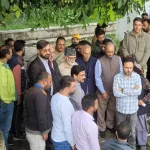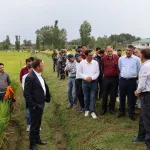The world we live in today is vastly different from what it was just ten years ago. In 2024, the landscape of global politics resembles a complex puzzle that is increasingly difficult to forecast or manage. The era of predictable international relations, dominated by a handful of superpowers, has seemingly vanished. It now appears that the rules are being modified as nations confront rising uncertainties and shifts in global context. Various elements, including volatile economic situations, emerging technological threats, environmental challenges, and disjointed international institutions, contribute to what some refer to as the “Age of Unpredictability.” But what does this actually imply?
Power Players beyond the West
After World War II, the United States emerged as a global leader, influencing the world in economic, military, and cultural aspects. However, this situation has changed significantly in recent years. China, for example, has used its financial power to become a major global player, altering trade dynamics, development strategies, and military influence. One notable example is China’s Belt and Road Initiative (BRI). Through investments in infrastructure projects around the world, China has positioned itself as a key partner for many countries, especially in Africa, South America, and Asia. This development has fostered new alliances and dependencies, resulting in shifts in the global balance of power.
Then there’s India, a nation that’s rapidly rising on the world stage, largely due to its growing economy and young population. India has taken a unique approach by not fully aligning with any one major power. Instead, it’s building its influence through partnerships across the spectrum, from the U.S. and European Union to its neighbors in Asia and Africa. This adaptability means that global power no longer rests solely with Western countries but is spread across an increasingly multipolar world, making it hard to predict where alliances and rivalries will land next.
Economic Nationalism on the Rise
As nations worldwide cope with inflation, supply chain issues, and the consequences of the COVID-19 pandemic, numerous governments are shifting their focus inward to prioritize national interests. This trend towards economic nationalism is transforming trade practices, as countries are increasingly emphasizing support for domestic industries and job creation over global integration. For example, in the United States, recent initiatives promoted under the “America First” agenda have aimed at revitalizing domestic manufacturing and decreasing reliance on imports, especially from China.
The impact of Brexit continues to resonate across Europe. The United Kingdom’s decision to leave the European Union has affected its trade relationships and compelled it to redefine its position on new terms. This rise in nationalism is not limited to the West; emerging economies are also adopting a more self-centered approach, emphasizing self-reliance to minimize foreign dependency, as India adopted “atma nirbhar bharat” idea for its self sufficiency and self reliance. While this focus on prioritizing national economies is understandable, it has resulted in a more fragmented global economy, where international cooperation is less prominent and countries have become less predictable as trading partners.
The Digital Frontier: Technology as a New Battleground
In the contemporary digital landscape, security encompasses not only military strength but also cyber capabilities and technological advancements. Cyber warfare has introduced a new dimension, enabling nations to disrupt each other without the need for physical military presence. Recent incidents, such as the 2021 Colonial Pipeline cyberattack in the United States, exemplify the vulnerabilities that persist despite enhanced cybersecurity measures. This attack led to significant gas shortages across multiple states, demonstrating how cyber attacks can have far-reaching consequences on essential services and daily life.
Moreover, artificial intelligence (AI) is increasingly integrated into various domains, including military operations and intelligence gathering. While the advantages of AI are substantial, its proliferation also brings forth critical ethical and security concerns. There is a growing apprehension that an arms race in AI development among major powers may result in the widespread deployment of autonomous weapons and advanced surveillance technologies. Such developments could potentially transform the nature of warfare, making conventional military engagements seem simpler by comparison. These digital threats aren’t bound by geography, adding to the uncertainty of global security in this age.
Climate Change: The Ultimate Unifier—or Divider?
Few issues are as urgently pressing as climate change. As we observe increasingly frequent severe weather events such as wildfires, hurricanes, and droughts, the need for climate action becomes undeniable. Yet, nations continue to face challenges in reaching a consensus on how to tackle it. The recent U.N. climate summit highlighted this divide, with wealthier nations reluctant to fully commit to providing financial support to the countries most impacted by climate effects—countries that have contributed the least to global emissions.
The Pacific Island nations are facing an existential threat due to rising sea levels. These nations have called on major polluters to take greater responsibility and provide assistance, but the responses have been inconsistent. The lack of a unified approach to climate change has led to frustration among vulnerable countries, which feel they are facing the worst of the crisis without sufficient support. This disconnect has introduced a new layer of unpredictability in international relations: as environmental pressures increase, so will the political tensions related to them.
A World without a Referee
Organizations such as the United Nations, the World Trade Organization (WTO), and various global treaties were previously fundamental to international stability. However, these entities are currently finding it challenging to adapt to the fast pace of change. Many of these institutions were established to respond to a different global landscape, one where the U.S. and its allies were the main architects of the international order. Today, as rising powers question the significance and efficacy of these institutions, we are left with frameworks that frequently seem outdated and immobilized.
The U.N. Security Council often struggles to take decisive action on critical issues because of the veto power held by its permanent members. This issue was particularly evident during the recent crisis in Ukraine, where Russia’s status as a permanent member complicated the global response. Additionally, the World Health Organization faced significant criticism during the COVID-19 pandemic, raising concerns about its ability to manage future health crises. As more countries find it challenging to rely on multilateral organizations for support, they are increasingly turning to regional alliances and bilateral agreements, which tend to be more fluid and less predictable.
Moving Forward in an Age of Uncertainty
As the world navigates this era of unpredictability, some experts argue that a more flexible and adaptable approach to diplomacy and alliances may be the only way forward. Smaller regional alliances and temporary partnerships are becoming increasingly common as countries realize they can no longer rely on outdated frameworks to solve new problems. However, this approach carries its own risks, as it can create a patchwork of agreements that may collapse in times of crisis.
Ultimately, the “Age of Unpredictability” is not about embracing chaos, but about adapting to a rapidly changing world. Countries must discover new ways to balance national interests with global cooperation, considering the unique challenges posed by technology, climate change, economic shifts, and security threats. If nations can embrace adaptability and prioritize cooperation where it matters most, there is hope that this unpredictable era could lead to a new form of stability. However, for now, we are experiencing a period of profound change, and the path forward remains uncertain.
(Author has done his Masters in International Politics from Aligarh Muslim University. Feedback: [email protected])








